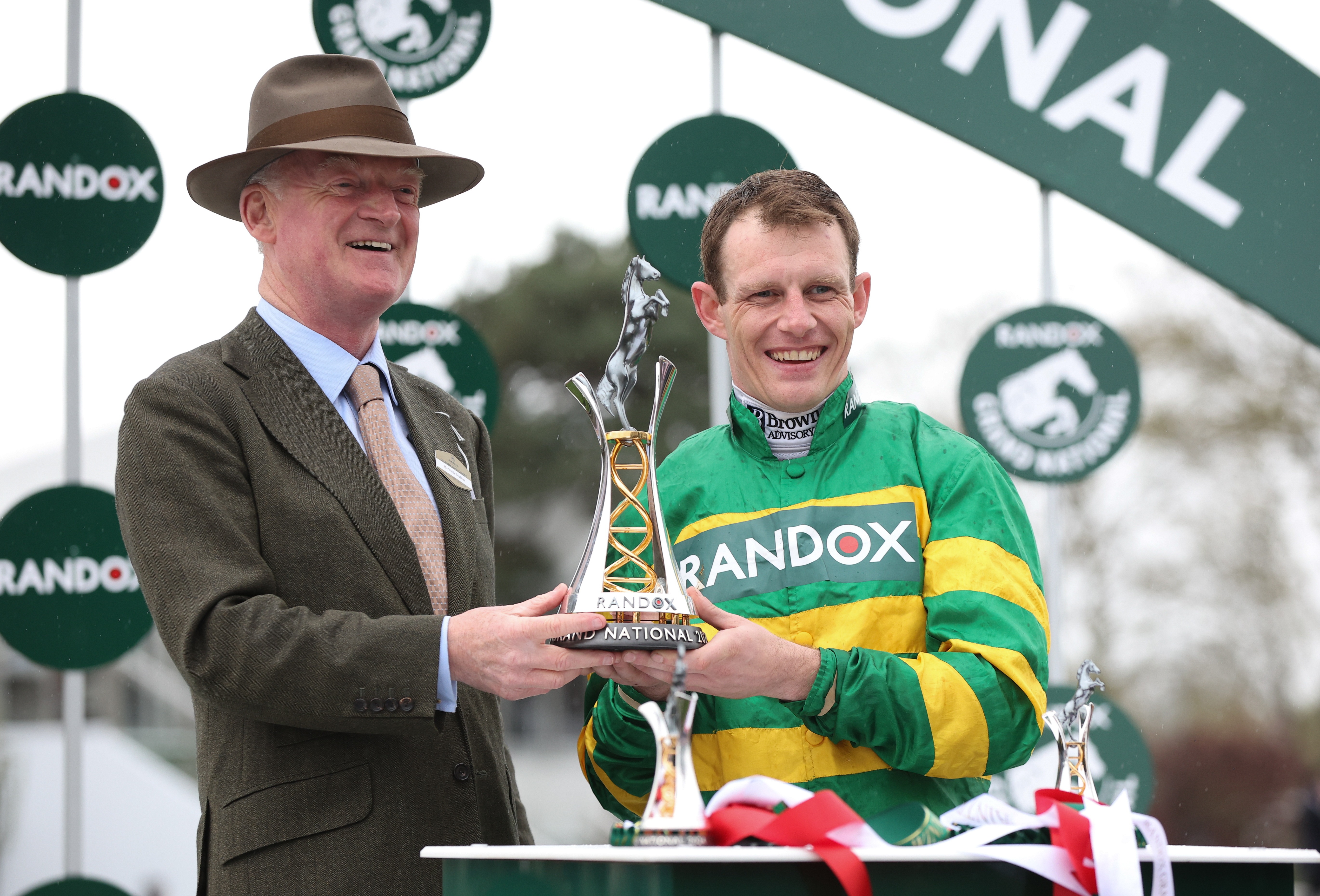Irish Maestro Dominates Cheltenham Festival
Willie Mullins is on track to secure both the Irish and British trainers titles following his triumph at the Grand National, the most prestigious race in Britain. Mullins' exceptional performance at the Cheltenham Festival, where he secured nine wins, positioned him as a strong contender for the title.
Shakeup in Title Race
Bookies initially underestimated Mullins' chances, giving him odds of 5-1 to win the British title. However, a series of victories at the Aintree Festival, including four Grade 1 wins, drastically shifted the dynamics of the title race.
Grand National Victory Seals the Deal
Mullins' success at the Grand National, with I Am Maximus ridden by Paul Townend, not only solidified his lead but also earned him a substantial £500,000 prize money. This win propelled him ahead of competitors Paul Nicholls and Dan Skelton in the rankings.
Ladbrokes' Odds and Reactions
Ladbrokes now views Mullins as the clear favorite, offering odds of 4-5 for him to clinch the title. Nicholls, the defending champion, has seen his odds slip to 7-2, while Skelton follows closely at 2-1. Nicola McGeady of Ladbrokes described the trainers title race as a thrilling three-way battle, with Mullins firmly leading the pack after his Grand National victory.
Frequently Asked Questions
What does the term ‘photo finish’ mean in horse racing?
In a ‘photofinish’, two or more horses are so close to each other that it’s impossible to tell who won with the naked eyes. In these instances, race officials will use a camera at the finish line to capture images in high speed and review the exact moment that each horse’s nostril reaches the finish line. Officials can accurately determine the order of finish by using the photo finish image.
Do different horse races take place in the UK?
Yes, there are various types of horse races in the UK, falling primarily into the categories of Flat racing and National Hunt (or jump) racing. Flat racing is held over flat tracks that range from 5 furlongs up to 2 miles. National Hunt racing focuses on both the horse’s jumping and speed. Races like steeplechases and hurdles feature obstacles. There are many variations of these two broad categories. For example, handicaps, maidens and conditions races. Each with its own rules and criteria.
How does handicapping in UK horse racing work?
In UK horseracing, the handicap system gives every horse an equally good chance of winning. Essentially, horses are assigned different weights to carry during the race based on their past performances. To level the playing fields, better horses are given heavier weights. The British Horseracing Authority is responsible for the handicapping process in the UK, and their team of handicappers regularly updates ratings following the results of races.
What are the ‘Classics” in UK horseracing?
The term ‘Classics,’ used in UK horseracing, refers to a group of five prestigious races which are considered by many to be the most prestigious contests for 3-year-old thoroughbreds. The 2,000 Guineas race, The 1,000 Guineas race, The Epsom Derby Race, The Epsom Oaks Race, and The St. Leger Stakes are all Classics. Wining one of the Classics is a great achievement for a racehorse. And winning all three races of a gender is rare and historic.
How do racehorses are bred and chosen for racing purposes?
Racehorses tend to be bred for the purpose of winning races. Breeders carefully select sires from proven racing lines to ensure that their offspring have the best characteristics in terms of speed, endurance, temperament, and so on. Thoroughbreds are most commonly associated with racing in the UK, and their bloodlines are carefully recorded. Prior to racing, racehorses undergo a thorough selection process, which includes pedigree evaluation, conformation assessment and performance during training.
What role does a steward play in horse races?
Stewards perform a critical role in ensuring fairness and compliance with racing rules in horse racing. They oversee the conduct of jockeys trainers and other racing staff, monitor the races for rule violations, and hold investigations into any incidents. In the event that rules are violated, the stewards may also be able to impose fines or suspending the race.
Statistics
- The annual Cheltenham Festival has an economic impact of over £100 million for the local Gloucestershire economy.
- The National Hunt racing season in the UK sees approximately 1,000 races with hurdles or fences each year.
- There are over 8,000 active racehorse owners in the UK, ranging from royals to common citizens.
- The Grand National at Aintree boasts a prize fund of around £1 million, making it the most valuable jump race in Europe.
- British racing oversees around 1,500 fixtures annually across its 59 racecourses.
- Horse racing contributes an estimated £3.7 billion to the UK economy directly and indirectly each year.
External Links
britishhorseracing.com
racingpost.com
thejockeyclub.co.uk
thejockeyclub.co.uk
britishhorseracingmuseum.org.uk
tattersalls.com
How To
How to train for a career as a jockey in the UK
Aspiring British Jockeys will begin by taking a foundation course, either at the British Racing School of the Northern Racing College. This is where they learn horse care, fitness and riding. After completing the foundation course, aspiring jockeys should enroll in an apprenticeship program or conditional training to gain experience. Physical fitness is paramount, as well as maintaining the correct weight. The British Horseracing Authority requires that potential jockeys obtain a license, which includes passing tests and practical assessments on racing rules. Professional development and personal fitness are essential to a jockey’s ongoing career.

